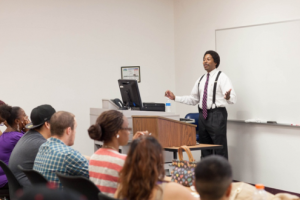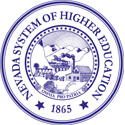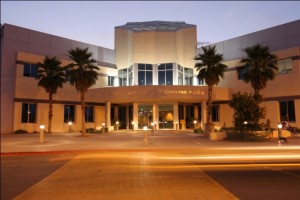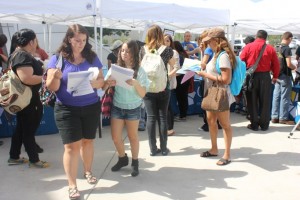Greetings to all! I hope your semester is going well. There is much activity on many fronts that I have covered in this newsletter, including financial aid, the e-Learning task force and of course, rumors and questions.
Please note that in the coming months, you may receive a call from Francine to come to lunch with me. Don’t worry, you’re not in trouble! You are an expert in your field of service to the college and I am hoping to sit down and learn more about you, your work and your thoughts about how to advance CSN. Please accept the invitation if you are available.
We are also instituting a monthly (most months) social reception, a casual time at the end of the week for faculty and staff to gather, get better acquainted with colleagues and unwind. Mark your calendar for Oct. 11 at 5 p.m. at Russell’s. Refreshments will be served.
Top 25 in the Nation

CSN Business Professor Kevin Raiford rated the fifth highest professor in the nation by RateMyProfessor
CSN Professor of Business Kevin Raiford was named by RateMyProfessor as one of the top 25 professors in the nation. In fact, he was ranked the 5th highest in the nation. Congratulations, Kevin!
Financial Aid
As a follow up to financial aid issues announced the first week of school, please know that we are winding down the solution on verification issues:
- All under-awards have been paid and we’re moving ahead to conclude DOE processing requirements.
- A special taskforce is working with students to address their questions.
- Aid going out this year will have already been subject to the enhanced verification process, conducted through ProEd Solutions.
We are finalizing a contract with an external consulting group that specializes in financial aid to assist us with our processes, policies, operations, structure and training in this areas.
Finally, CSN has begun the process of overhauling financial aid operations to ensure the highest level of service, accuracy and accountability in this area of the college.
We will keep you informed of new information in this area as it arises.
CSN Connections:
Thank you to all student services and academic staff and faculty that participated in the CSN Connections events at the start of the semester. They were a huge success! These events exist to connect students with the many services we offer to help them succeed in a fun and welcoming environment with music and, of course, free food. They also help us highlight the importance of student success to our students and stakeholders and the critical role that student services staff play in helping students achieve.
Those who participated conducted two of these fairs each day at each campus to ensure our students that attend during traditional hours in the day and later courses in the evening both were connected to the number of services available to help them succeed.
Thank you again for all of your efforts!
|
The Santa Fe Station on North Rancho Drive will be the site for our 2013 Holiday Party on Thursday, December 12. Please mark your calendars and plan to join us for this wonderful celebration. Please note the new location. |
eLearning Taskforce
As Darin Dockstader and I have reported, the Chancellor has appointed an eLearning Taskforce. The Chancellor will chair the Taskforce. The members and roles of the taskforce are:
| Kevin Carman | UNR | Admin; Provost |
| Robert Wynegar | WNC | Admin; Provost |
| Christian Fritsen | DRI | Faculty |
| Fred Lokken | TMCC | Faculty |
| Darren Divine | CSN | Admin; Provost |
| Lisa Frazier, | GBC | Admin |
| Erika Beck | NSC | Admin; Provost |
| Mark Fink | UNLV | Faculty |
| Tony Scinta | NSC | Faculty |
| Caroline (Carrie) Bruno | GBC | Faculty |
| Jeffrey Wong | UNR | Faculty |
| Terry Norris | CSN | Admin |
| Kendall Hartley | UNLV | Faculty |
| Cynthia Clark | UNLV | Student |
| Alex Porter | GBC | Student |
| Paul Davis | TMCC | Faculty |
| Richard Kloes | WNC | Faculty |
Here is the charge to the committee:
At its March 2013 meeting, the NSHE Board of Regents received and enthusiastically accepted the report prepared by Richard N. Katz & Associates: E-Learning and Higher Education’s Iron Triangle: Opportunity, Affordability and Student Success at NSHE. The Board directed the Chancellor to develop and proceed with a plan for the implementation of the report’s recommendations. In response to that direction, I am creating an ad hoc committee charged with setting priorities, evaluating and pricing alternatives, and crafting an implementation plan per the Board’s direction. This Steering Committee will report to me with a deadline of December 2014.
Given the urgency expressed by the Board and considerable time and resource commitments necessary for the implementation of the numerous recommendations in the Katz report, we need to make the distance education- related issues that support student success a systemwide priority and focus on our common goal of graduating more students. The reality of NSHE’s limited resources means that the promising possibilities and benefits of adaptive learning, learning analytics, digital course materials and other areas of service and investment will need to be accomplished in phases indicative of the overall priority of the Board. The Committee report’s recommendations must reflect both the challenges of our resource constraints and the need for urgent and impactful action.
While the Katz recommendations did not specifically address remediation, critical success metrics indicate good reason to focus early efforts on remediation and the corresponding transition to “gateway” courses that build upon successful remediation. Student success in mathematics is a strong indicator of a student’s likelihood to persist and ultimately graduate. Remediation rates in mathematics continue to be unacceptably high, and despite the successes of the Remedial Transformation Project, more work remains to be done. We have the opportunity to build upon our faculty’s successful and transformative work and the momentum they have generated by focusing the initial work of the committee on remediation. We know that student preparation for collegiate work remains a barrier to their success and progress. We know too that in order to consolidate success in remedial courses, we must ensure students ability to immediately proceed to regular credit bearing college work. Evolving technologies such as adaptive learning must play a part.
Phase 1: Remediation/Skills Modules
The Steering Committee shall consider approaches and technologies that utilize e-learning in the support of remediating students in a timely and effective fashion. The Committee shall develop an education and business model, a program plan, and budget for the implementation of on-line and e-learning remedial modules initially in Mathematics and then English. The recommended model must include appropriate student support mechanisms, including but not limited to, on-line and face-to-face tutoring and other student support strategies. Key to the success of this effort will also be plans for ease of registration by students at all NSHE institutions, in addition to their home institution. The plan developed by the Steering Committee must be complete by June 2014.
The recommended approaches for remedial education shall consider strategies for developing remedial skill modules internally, through vendor partnerships, or both. The recommended approaches must include provision for students to complete required remediation in a self-paced environment that is adaptable to each student’s learning style. The measure of success for remedial education will be successful completion of the related entry level college-level course, and the Committee shall consider that transition in formulating its recommendations.
Phase 2: E-Ncore
The heart of the report’s recommendations calls for the development of an e-Ncore whereby the campuses would develop and deliver e-Ncore master courses for the general education curriculum. The Committee shall develop an education and business model, a program plan, and budget for the implementation of e-Ncore on-line gateway course offerings that will be transferrable to all NSHE institutions.
Given the limited human and financial resources of the System and its institutions, it is reasonable to expect that implementation of the full general education curriculum under the e‑Ncore is not feasible in the short-term. Therefore, the Committee may develop a phased implementation plan that includes a timeline for implementation across the general education curriculum. The Report should articulate a strategy or rationale for sequencing priorities within the general education curriculum.
I am expecting that wherever best from the student perspective the approaches identified by the Committee will build on the considerable excellent work already accomplished in the System. As was noted at the March Board of Regents meeting, NSHE colleges and universities have married the on ground and on campus modes of instruction in response to the changing preferences and demographics of those we serve. Our goal now is to build in ways that extend the benefits of our collective strengths to all of our students where and when they need us.
Phase 3: Other Recommendations
The Steering Committee shall evaluate and prioritize the remaining recommendations of the Katz report not otherwise addressed in Phases 1 and 2. The Committee shall recommend a timeline for implementation of the other recommendations.
Additional Committee Authority
In its development of an education and business plan, the Committee shall consider partnerships with external vendors and may seek and retain the advice and counsel of subject matter experts, internal or external to the System, as needed. In addition, the Committee may establish subcommittees with appropriate student, faculty and administrative representation to meet the provisions of this charge. Any data requested by the Committee will be provided by the System Office.
|
“15 to Finish” is a campaign endorsed and promoted by all NSHE institutions to encourage students to enroll for 30 credits a year. Data indicate that students who enroll full-time—15 credits a semester—are more likely to complete a certificate or degree program in a timely manner. This saves students money and time. Please urge students to take 15 credit hours. By adding one or two classes a year, students will complete their degree programs faster and at lower cost, given the annual increase in the cost of education. |
Questions from Faculty and Staff Members:
“I don’t understand why the issues in financial aid were not known and acted on earlier.”
This is an excellent question. In the area of financial aid, audits—including reviews by the Department of Education—lag a year. Specifically, NSHE’s auditor, Grant Thornton, prepares an A-133 audit of federal funds, the results of which are forwarded to the Board of Regents for approval. Based on a sample from the 2011-12 Grant Thornton audit, the U.S. Department of Education requested in March 2013 that CSN complete a review of the verification of awards from that year. The Grant Thornton audit had found that for nine of 58 students tested, CSN had not updated federal application for student aid information. Hence, ProEd was retained to verify results from 2011-12. CSN then asked the company to verify awards for 2012-13 and the current year this summer.
The DOE’s response on the 2011-12 A-133 audit was then received on July 18, 2013. The response for the 2012-13 audit will be completed next summer and so there is a lot of lag time associated with these processes as well. Once CSN was aware of the extent of the problem, the college acted, made an announcement to public stakeholders and began contacting impacted students.
“How much will CSN have to repay and how many students were impacted?”
Once the assessments are complete and finalized, CSN will be able to provide a total dollar amount and number of students. They will not be asked to repay over awards and under awards are being automatically funded to those students’ accounts.
“When the salary study is done are some salaries being reduced?”
No. Our objective is to correct salary equity and compression problems.
“When did student completion become such a hot issue, and how do we balance that with student learning and access?”
Since early in 2010, national and state attention to certificate and degree completion has eclipsed other student-related issues. Major national foundations, the National Governor’s Association, professional associations in higher education, and the White House have focused our attention on completion and career readiness. From my observation, this new national agenda has sometimes overshadowed student learning, assessment, and a broader view of student access. Liberal education has taken a back seat to career education and a perceived urgency to “get students through.”
“I have not had a good experience on search committees. The hiring process seems to take too long and does seem to be very efficient.”
For several months, a new hiring policy has been in development. It is designed to improve the hiring process. The final draft of the policy is about ready for the Faculty Senate to act on it.
Best regards to all.
–Mike Richards


